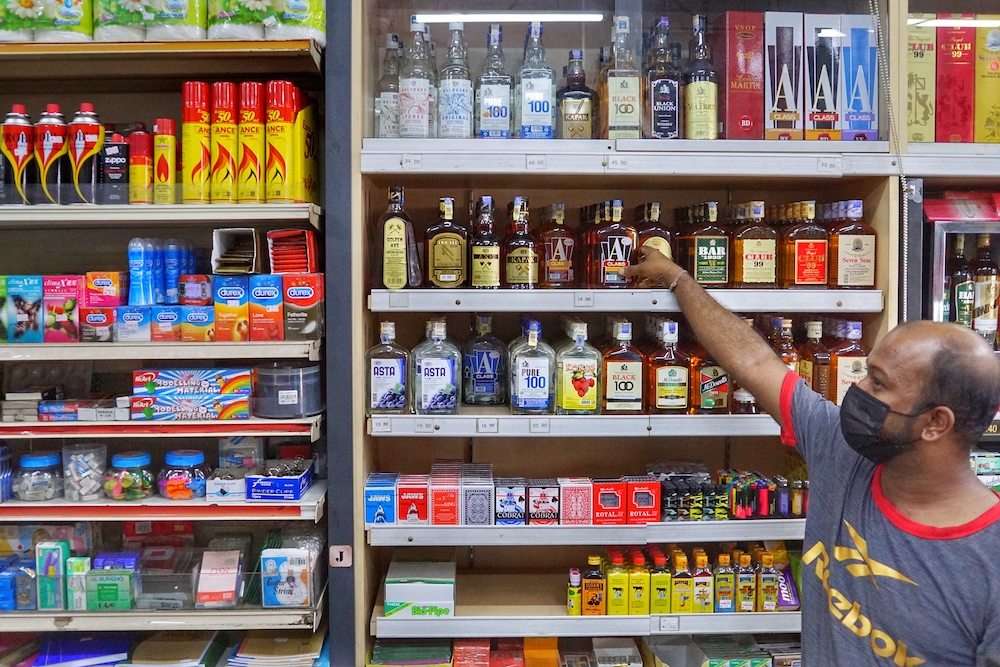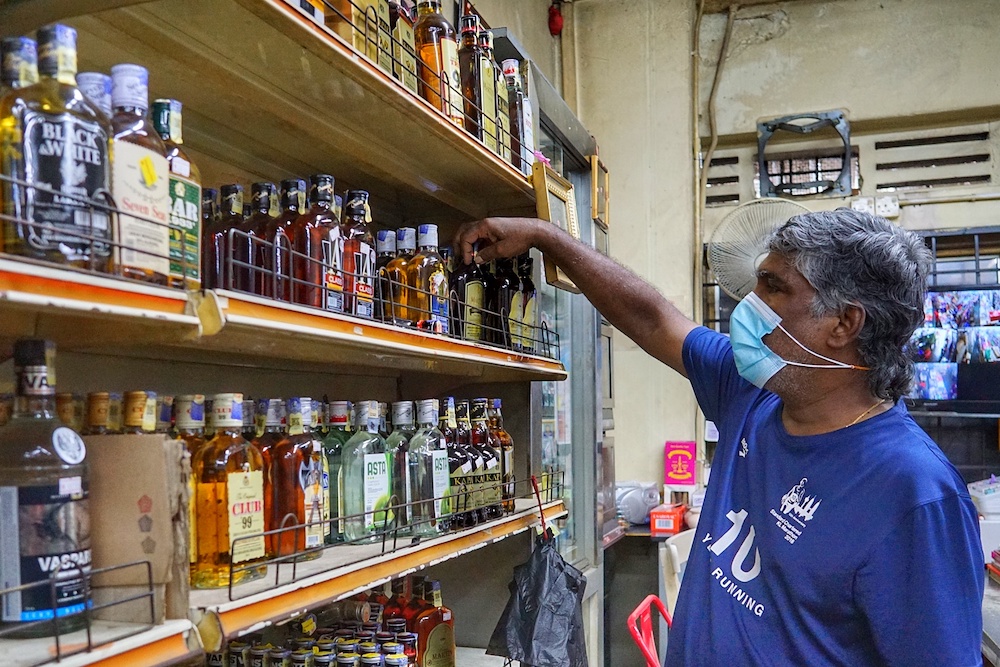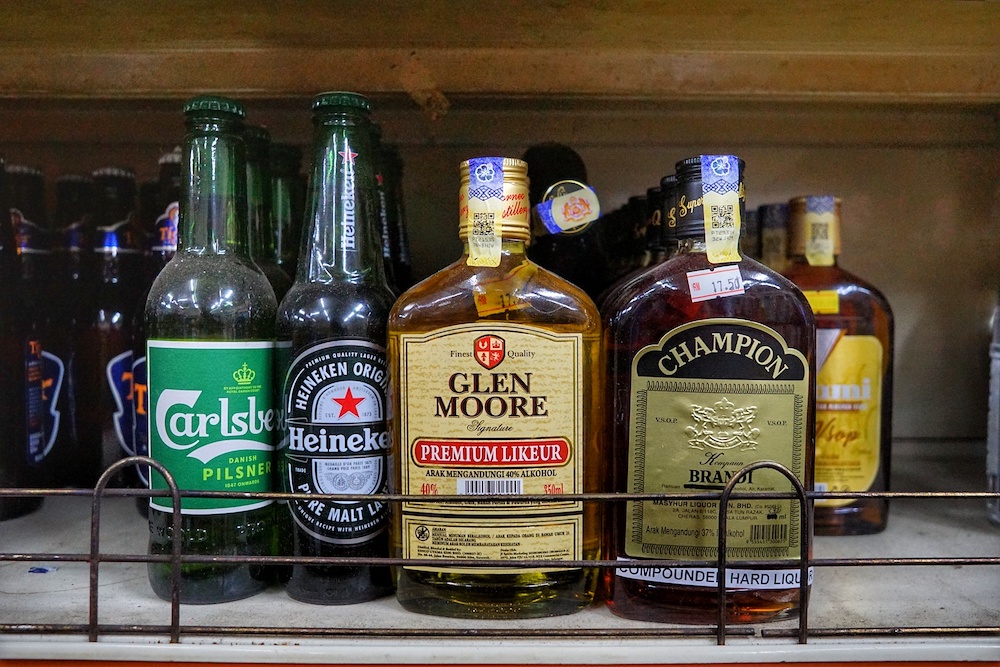
Govt won't rule out expansion of liquor sale ban - deputy minister
The government has not ruled out the possibility of expanding the ban on the sale of liquor at sundry and grocery shops, convenience stores as well as Chinese medicine shops, to other states, besides the Federal Territories.
Deputy Minister in the Prime Minister’s Department (Religious Affairs) Ahmad Marzuk Shaary said that he welcomed the latest ruling of Federal Territories Minister Annuar Musa via the Kuala Lumpur City Hall (DBKL) in disallowing liquor sale in these shops from October next year.
He said the matter not only involved religious demands, but it also received positive feedback in general from civil society including Muslims and non-Muslims.
“Currently, the ban is only applicable to the Federal Territories, but we do not rule out the possibility that it will be expanded to other places.
“We also received positive comments and views from the community even though there were few who voiced their disagreement,” he said.
He said this to reporters after presenting house key to a single mother Rashidah Semail, 48, under the Malaysian Islamic Economic Development Foundation (Yapeim) ’s MyHaus Inspiration Programme’s in Kampung Parang Puting, Pengkalan Chepa in Kota Bahru today.
Ahmad Marzuk said that Malaysia is slightly behind in terms of controlling the sale of liquor.
“If we look at our neighbouring country such as Singapore, it has stricter rules involving several restrictions. However, this is a very good start even though it is only implemented in the Federal Territories thus far.
“Hence, this is part of the government’s holistic strategy that needs to be supported by all citizens regardless of religion, race and political affiliation. This is not a political agenda,” he said.
Deputy Minister in the Prime Minister’s Department (Religious Affairs) Ahmad Marzuk Shaary said that he welcomed the latest ruling of Federal Territories Minister Annuar Musa via the Kuala Lumpur City Hall (DBKL) in disallowing liquor sale in these shops from October next year.
He said the matter not only involved religious demands, but it also received positive feedback in general from civil society including Muslims and non-Muslims.
“Currently, the ban is only applicable to the Federal Territories, but we do not rule out the possibility that it will be expanded to other places.
“We also received positive comments and views from the community even though there were few who voiced their disagreement,” he said.
He said this to reporters after presenting house key to a single mother Rashidah Semail, 48, under the Malaysian Islamic Economic Development Foundation (Yapeim) ’s MyHaus Inspiration Programme’s in Kampung Parang Puting, Pengkalan Chepa in Kota Bahru today.
Ahmad Marzuk said that Malaysia is slightly behind in terms of controlling the sale of liquor.
“If we look at our neighbouring country such as Singapore, it has stricter rules involving several restrictions. However, this is a very good start even though it is only implemented in the Federal Territories thus far.
“Hence, this is part of the government’s holistic strategy that needs to be supported by all citizens regardless of religion, race and political affiliation. This is not a political agenda,” he said.
***
Meanwhile, MM Online:
Sundry, medicine shop proprietors see gloomy days ahead following DBKL’s liquor sale ban next year

An employee stands in front of liquor bottles in a convenience shop near Sentul November 19, 2020 — Picture by Ahmad Zamzahuri
KUALA LUMPUR, Nov 22 — Chinese medicine and sundry shop proprietors are anticipating dark days ahead over the latest liquor sales restriction imposed by Kuala Lumpur City Hall (DBKL) that will see their dwindling revenue further diminish.
Malay Mail went around the city and spoke to some of these proprietors who foresee a huge drop in revenue when the regulation kicks in on October 1, 2021.
DBKL’s proposed new guideline states that sundry shops, convenience stores and Chinese medicine shops in Malaysia’s capital city will no longer be allowed to sell hard liquor except for traditional medicine purposes from that date.
This comes as the Kuala Lumpur and Selangor Chinese Assembly Hall warned last week that restricting liquor sales at convenience stores will hurt small businesses, who are still reeling from the Covid-19 pandemic’s effects.
Law Fook Seng, the proprietor of Kedai Ubat dan Runcit Kim Loy, described the new guideline as one of the “harshest” imposed to date.
“Surely affected. Our business is sure to be affected and our regular customers will be inconvenienced because they come to us for their needs due to the trust we built over the years,” he said.
His shop in Taman Midah, Cheras has been operational since 2001.
Law said business is already difficult to run at the moment due to the pandemic and the government’s conditional movement control order (CMCO), adding that he is barely able to stay afloat by selling necessities which has allowed him to retain most of his customers.
He said it is unacceptable for the authorities to adopt a “one-size-fits-all approach” which did not provide a choice for business owners.
The new guideline would definitely affect small-time sundry shop owners in residential areas with their goods that are usually priced a bit lower than at supermarkets, resulting in smaller profit margins.
“My margins are very small and I would say 20 per cent of my sales come from selling alcohol.
This ban will affect my business deeply, and our income will drop quite a lot,” said Kedai Runcit Yen Chong Hong proprietor Chow Yin Ching at his shop in Kepong.
“Ten to 20 per cent of the shop’s income is from selling alcohol because in this area there aren't many that sell liquor.”
Malay Mail went around the city and spoke to some of these proprietors who foresee a huge drop in revenue when the regulation kicks in on October 1, 2021.
DBKL’s proposed new guideline states that sundry shops, convenience stores and Chinese medicine shops in Malaysia’s capital city will no longer be allowed to sell hard liquor except for traditional medicine purposes from that date.
This comes as the Kuala Lumpur and Selangor Chinese Assembly Hall warned last week that restricting liquor sales at convenience stores will hurt small businesses, who are still reeling from the Covid-19 pandemic’s effects.
Law Fook Seng, the proprietor of Kedai Ubat dan Runcit Kim Loy, described the new guideline as one of the “harshest” imposed to date.
“Surely affected. Our business is sure to be affected and our regular customers will be inconvenienced because they come to us for their needs due to the trust we built over the years,” he said.
His shop in Taman Midah, Cheras has been operational since 2001.
Law said business is already difficult to run at the moment due to the pandemic and the government’s conditional movement control order (CMCO), adding that he is barely able to stay afloat by selling necessities which has allowed him to retain most of his customers.
He said it is unacceptable for the authorities to adopt a “one-size-fits-all approach” which did not provide a choice for business owners.
The new guideline would definitely affect small-time sundry shop owners in residential areas with their goods that are usually priced a bit lower than at supermarkets, resulting in smaller profit margins.
“My margins are very small and I would say 20 per cent of my sales come from selling alcohol.
This ban will affect my business deeply, and our income will drop quite a lot,” said Kedai Runcit Yen Chong Hong proprietor Chow Yin Ching at his shop in Kepong.
“Ten to 20 per cent of the shop’s income is from selling alcohol because in this area there aren't many that sell liquor.”

S. Rajan shows the liquor sold at his convenience shop in Kuala Lumpur November 19, 2020 — Picture by Ahmad Zamzahuri
In Sentul, S. Rajan who has worked at Vijaya Store for the past eight years, said the ban is unfair and will bring about uncertainty to the shop’s future.
“That’s not fair because half of our business depends on liquor... so if you stop us, what are we going to do?” he told Malay Mail.
Rajan said Covid-19 has already cut the store’s sales up to 30 per cent and doubts there will be enough income for the store’s owner to pay rent and workers’ salaries if they cannot sell alcohol.
“Even we might get retrenched,” a flustered Rajan said, referring to himself and the other employees.
DBKL has already come under fire from critics who call the new proposed regulation an infringement on minority rights.
Beer will still be allowed to be sold at these premises, although only between 7am to 9pm, and placed away from other beverages.
The ruling also states that business premises that sell liquor cannot be in front of police stations, places of worship, schools and hospitals.
“That’s not fair because half of our business depends on liquor... so if you stop us, what are we going to do?” he told Malay Mail.
Rajan said Covid-19 has already cut the store’s sales up to 30 per cent and doubts there will be enough income for the store’s owner to pay rent and workers’ salaries if they cannot sell alcohol.
“Even we might get retrenched,” a flustered Rajan said, referring to himself and the other employees.
DBKL has already come under fire from critics who call the new proposed regulation an infringement on minority rights.
Beer will still be allowed to be sold at these premises, although only between 7am to 9pm, and placed away from other beverages.
The ruling also states that business premises that sell liquor cannot be in front of police stations, places of worship, schools and hospitals.

Bottles of liquor that are being sold are seen in a convenience shop in Kuala Lumpur November 19, 2020 — Picture by Ahmad Zamzahuri
At present, businesses that are allowed to sell liquor include restaurants, pubs, bars, hotels, commercial complexes, warehouses, supermarkets, hypermarkets as well as promotional activities that serve liquor.
DBKL had previously in June announced a freeze on all new applications for licences to sell alcohol with immediate effect.
The latest announcement has, not unexpectedly, received praise from Islamists, including PAS which said that it is a timely move and the Federal Territories should learn from Kelantan’s tight regulations on alcohol sale which has been in place for decades.
Meanwhile, the Selangor and Kuala Lumpur Wine and Spirit Chinese Dealers Association has reportedly said that the restrictions will not only negatively impact them but also the government’s coffers.
Yesterday, Deputy Minister in the Prime Minister’s Department (Religious Affairs) Ahmad Marzuk Shaary said it was possible the restriction would be expanded nationwide.
DBKL had previously in June announced a freeze on all new applications for licences to sell alcohol with immediate effect.
The latest announcement has, not unexpectedly, received praise from Islamists, including PAS which said that it is a timely move and the Federal Territories should learn from Kelantan’s tight regulations on alcohol sale which has been in place for decades.
Meanwhile, the Selangor and Kuala Lumpur Wine and Spirit Chinese Dealers Association has reportedly said that the restrictions will not only negatively impact them but also the government’s coffers.
Yesterday, Deputy Minister in the Prime Minister’s Department (Religious Affairs) Ahmad Marzuk Shaary said it was possible the restriction would be expanded nationwide.
Alcohol licensing and guidelines, if want to follow other countries like in Europe....
ReplyDeletePAS TIPU...!!!!
In UK there are pubs, taverns, liquor barns, off-license shops EVERYWHERE. Even small villages have the obligatory post-office and pub or tavern where locals gather to socialize. You can even order alcohol online and have it deliver to your doorstep. So why not we follow these western licensing guidelines? Why only follow portions of it that is convenient for your agenda?
Wee KHAT Siong.......BANG TABLE in parliament lah. Many sundry shop and TCM shops will soon go out of business because you are so BOH LAM PHAR just want to bodek PAS and stay in power.
3 MPS can solve this problem but simply refuse. And KT keep blaming Toonsie and DAP42 for everything. Ha ha ha so silly.
This is the typical hypocrisy of the islamist to show they are good muslims.
ReplyDeleteBut, this is only one of the many steps leading to a taliban-type Malaysia
Lest We Forget, with connivance from MCA.
ReplyDeletey follow kafir european n not islamic arabia? no wonder most muslim like rpk vote with their feet to europe, thats muslim destination? another tribe that love europe is from ccp land, but that one understandable, some zombie do appreciate democracy, they want voting, paper or foot.
ReplyDeleteMfer, check with yr 台毒morons how many of those 'chinese' tribe in Europe & Yankee land r majority CCP China bashers from HK & Formosa lah!
Delete& Know what have u just implied?
Wakakakakakaka…
They r just like u - a demoNcratized katak cloaking for mates!